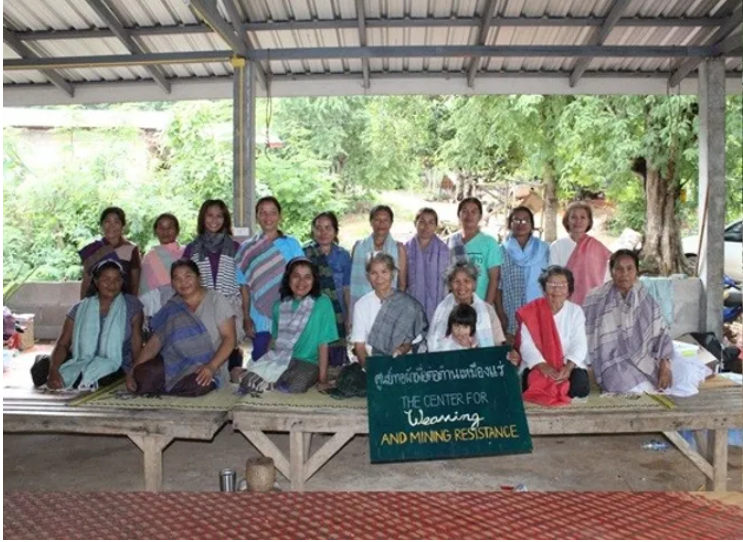The Radical Grandmas Collective
By Kirthi Jayakumar
Seventeen of the 22 Na Nong Bong weavers in their new weaving center. Source: Photo by Hallie O’Neill / The Isaan Record
For nearly two decades, a group of grandmothers – comprising activists and organizers – have been taking on the Tungkum Ltd. (TKL) gold mine in Na Nong Bong village in Loei, Thailand. The group, known as the Radical Grandma Collective, comprises Isaan women from Northeastern Thailand (Cultural Survival, n.d.; Mongelli, 2020).
Early beginnings
Since 2006, TKL has been mining gold at a distance of under 1 kilometer from the villagers’ homes. Their heavy mining produced significant impacts on the villagers’ health and environment (Mongelli, 2020). Waste from the mines encroached into their rivers and areas surrounding it, destroying their sources of clean water and livelihood, namely agriculture (MIIS Network, n.d.). From polluted water and outbreak of skin rashes to the presence of dead fish and crabs in their rice paddies and lower rice yields, TKL’s impacts have resulted in major setbacks the local residents’ well-being and health across six villages in the region.
In 2008, the Khon Rak Baan Kerd was established to create a knowledge repository on the adverse impacts of mining. Among these members were the Radical Grandmas – yet to be organized under the banner. They were weavers, who had been selling their products locally to raise funds to support their protests against the mine (Cultural Survival, n.d.).
Resisting extractivism
In 2016, The Radical Grandmas began to actively resist TKL. Ranong Kongsaen, one of the grandmas, spoke with allies from the US on the role of foreign support in enabling their anti-mine resistance. A group of women from the US were introduced to Na Nong Bong during a study abroad program that focused on human rights and the environment (Mongelli, 2020). In a meeting with them, Ranong asked if the women from the US would sell the scarves they wove in the international market while also sharing their story of anti-mining activism, so that they could fund their resistance.
The Radical Grandma Collective emerged from that collaboration. The community-driven project involves the Grandmas weaving scarves and setting their prices, and their friends from the US selling these items while also spreading word on their story. Originally commencing with scarves woven on wooden looms, the grandmas now grow cotton, which they spin into scarves after dyeing them in natural colors (Mongelli, 2020). The scarves are then bought directly by the US women, and sold globally. Additional proceeds are returned to the Grandmas.
Beyond Resistance
Even as the Radical Grandma Collective started out to resist TKL, the ripple effects of their approach both to resistance and to funding their resistance are manifold.
A powerful example of feminist foreign policy, these women built key partnerships across borders to question extractivism and harm to their food sovereignty. In doing so, they also preserved a traditional art form by creating a cooperative to make handwoven scarves. They preserve their cultural practices and way of life, which extractivist mining threatened, and in the process, resisted a systemic barrier.
Through their efforts, these women also prioritized the provision of economic opportunities for women in a manner that both sustained their activism and themselves (MIIS Network, n.d.). The funds they raise help them travel to court, pay for food and events to raise awareness and advocate for their cause, and to sustain themselves (MIIS Network, n.d.). These economic opportunities do not come at the cost of community building, but rather foment it. Even as one or a few grandmas weave, their families and friends sit around them, talking and passing time. When the weaver wants to take a break or attend to other things in the day, another grandma takes over and continues weaving. The strong bonds of community that are built in the process ensure that they have the rapport and solidarity they need to continue their anti-mining protests.
Facing pushbacks
Even as they resist for their very basic right to health and access to their lands, TKL has sued the villagers over 20 times. They have also tried to discredit human rights defenders suggesting that they are threatening national security by protesting against the development of the country. There have also been instances where TKL used violence and intimidation to silence the protestors. For example, on March 15, 204, 300 masked men attacked the villagers who sat guard by a blockade they had built on the road leading to the mine. Several of them were beaten, and trucks illegally retrieved the extracted gold and copper ore from the whine (Cultural Survival, n.d.; Mongelli, 2020).
The villagers’ efforts have kept TKL from actively operating the mine since 2013, and environmental conditions are improving in the community. Now, the community has refocused its fight on community relationships, mental and Radical Grandma Collective physical well-being, and the economy. The effects of mining and the trauma of being engaged in protest for over a decade has left scars on the community, which is ready to embark on the long road to healing.
References:
The Radical Grandma Collective: www.radicalgrandmacollective.com. The Middlebury Institute Site Network (MIIS Network) (n.d.). "Radical Grandma’s Collective." https://sites.miis.edu/csil/holiday-pop-up-market/featured-vendors/radical-grandmas-collective/
Cultural Survival (n.d.). “The Radical Grandma Collective.” https://www.culturalsurvival.org/publications/cultural-survival-quarterly/radical-grandma-collective
Mongelli, Valeria (2020). "Thailand’s Radical Grandmothers." https://thediplomat.com/2020/09/thailands-radical-grandmothers/
